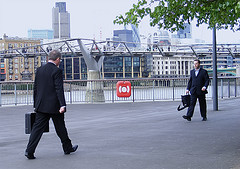 Many road warriors have excellent immune systems because, after all, they reach a higher level of exposure than people who stay within their communities. While getting exercise, eating well, and getting plenty of sleep can help the frequent business traveler stay well, the high cost of rescheduling travel is a strong deterrent to canceling a trip when they do get sick. Many airlines charge as high as $150 or more simply to change a domestic ticket in addition to the additional cost of the new ticket, and hotels may require you to forfeit a night’s stay.
Many road warriors have excellent immune systems because, after all, they reach a higher level of exposure than people who stay within their communities. While getting exercise, eating well, and getting plenty of sleep can help the frequent business traveler stay well, the high cost of rescheduling travel is a strong deterrent to canceling a trip when they do get sick. Many airlines charge as high as $150 or more simply to change a domestic ticket in addition to the additional cost of the new ticket, and hotels may require you to forfeit a night’s stay.
Doctors recommend that if you have a fever and are regular coughing or sneezing, you are probably contagious and shouldn’t fly. Â The CDC recommends only traveling when you feel well because staying away from others when you’re sick can help protect everyone’s health, but let’s face it: Â staying home is not always good for business and canceling a trip because you’re sick is not always a good career move. Therefore, business travelers may very well be in the position where they must travel when they are sick.
What can you do about it?
- If you are sick and can change your trip, call the airline and politely ask for their help. If you can get a doctor’s note, that may help. If the first representative refuses to accommodate, politely thank them and call back to get a different representative.
- Sick or not, consider carrying anti-bacterial wipes and swiping them across the tray tables, door and sink knobs in airplane lavatories, remote controls (in the hotels too!), and wash your hands every chance you get.
- Always do your best to get plenty of good quality sleep, stay hydrated, get enough exercise and eat well. These are standard operating procedures at home and have to be carried through to your travels as well.
- If you must be on the road a lot, familiarize yourself with the change fees of the various airlines on your routes. For example, Southwest Airlines doesn’t charge cancellation or change fees, but they may not handle the routes you need to travel.
Invest in an Annual Travel Insurance plan
Frequent travelers should invest in an annual travel insurance plan. If you find yourself ill in a hotel room in a foreign country, a call to your travel assistance services line can help you find a local doctor that accepts your travel medical insurance.
If you have to return home on an emergency, you’ll have help scheduling alternative transportation and with trip interruption coverage, you won’t have to pay for those unexpected charges.
Accidents and injuries can occur on a business trip just as easily as on vacation. A serious accident or illness abroad could bankrupt you, as these stories make clear:
- A vacation-turned-horrific-nightmare underscores the need for medical and evacuation travel insurance
- Don’t rely on a Facebook campaign to raise funds after your travel disaster
- Bungled Cruise Ship Evacuation Highlights the Need for Evacuation Coverage
So, be sure your annual plan has medical evacuation coverage to get you back home if you are seriously ill or injured.
See our recommendations for business travel insurance for complete details.
